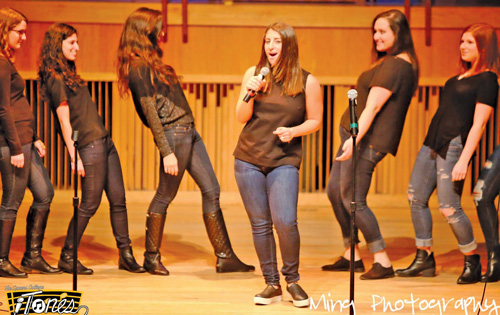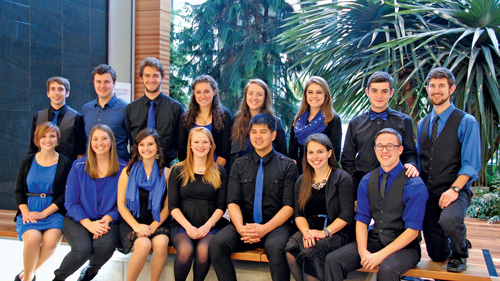Jewish a cappella on campus
Permanent link
Tizmoret's soloist Thalia Sharon and other group members performs recently during the iHearVoices Concert. From left: Tali Rainess, Amanda Cinnamon, Leora Graber, Maddy Rosenbaum and Tamara Heller.
In the American musical comedy Pitch Perfect, world domination, singing talent, rivalries, friendships, and even a much needed vacation from boyfriends bring the Barden Bellas and other a cappella groups together.
In the real world of Jewish collegiate a cappella groups, singers blend their love of music with Jewish culture and identity. There are newbies and veterans, homebodies who perform closer to campus, and adventurous groups who tour all over.
So what's the "it" factor that makes Jewish a cappella groups, well, Jewish? Is it breaking out in song on Shabbat? Is it knowing Hebrew?
For Shabbatones President Aaron Zell, Jewish a cappella is all about sharing music with diverse audiences and honoring traditions. Earlier this year, the Shabbatones performed at the Wells Fargo Center for the National Hockey League's Philadelphia Flyers. Last year, the group celebrated its bar mitzvah year with its "13" CD. That release includes "Achshav," -- which means "right now" in Hebrew) -- its biggest hit of the last two years.

In 2014, the Penn Shabbatones attended a Chanukah party at the White House.
The group has shared its alumni song "Umacha" with President Obama and the First Lady and audiences stretching from California to South Florida. "Every time we have a concert and there are alumni in the audience, we invite them on stage to sing it with us," said Zell. "These moments of friendship are really powerful."
The group of 16 is excited about traveling to the Midwest in January to be part of an a cappella concert at North Suburban Synagogue Beth El (NSS Beth El) in Highland Park, where Zell grew up. "I get to share my Shabbatones family with my family in Highland Park," said Zell, grandson of philanthropist Sam Zell and a Chicagoland Jewish High School graduate.
NSS Beth El's Hazzan Ben Tisser said song has been a huge part of Jewish identity for the last few centuries. When Moses led the Jewish people out of Egypt, they broke out in song as soon as they crossed the Red Sea.
The synagogue's January Shabbat of Song weekend includes celebrating with Hebrew, Israeli, and American top 40 songs. The popularity of Glee and Pitch Perfect inspired the Highland Park synagogue to organize its first Jewish a cappella concert, which will feature some of the best Jewish collegiate a cappella groups from five campuses.
"We will bring over 70 college kids together in one building to showcase their art and show our kids that there's another way you can be Jewishly involved on campus."
While Tisser said he was familiar with a few groups, he researched others and decided to book Jewop after discovering their "great sound and fantastic energy" in a YouTube video.

Jewop, Madison's only Jewish a cappella group, recently participated in the a cappella showcase, BadgerThon, a benefit for a local children's hospital.
The repertoire of Jewop includes Hebrew songs and arrangements with jazz and Afro-Cuban music. "We like to push the envelope of what a Jewish a cappella group can be," said Matt Allen, Jewop's co-music director. "One mash-up is an arrangement of "Salaam Rav" and "Ohev Shalom." It has a funky reggae tone, and people love it."
Allen, who grew up in a small town Wisconsin, joined Jewop as a junior. His girlfriend Nicole, who is Catholic, enlisted his help to master Hebrew pronunciation for some songs, and he had already seen her perform in the group's shows.
"Because there wasn't a huge Jewish community in the town where I grew up, I didn't become interested until I approached it through music," he recalled. (By the way, his mom is thrilled about this development).
Tizmoret at Queens College had a reputation for being the Orthodox-Jewish a cappella group, but its members include Reform Jews and secular Jews, and two non-Jews who are converting.
Members also share a competitive spirit, and it shows. All three times the group traveled to Washington, DC to compete in Kol Ha'Olam's National Jewish a cappella contest -- 2011, 2012, and 2015 -- it won first place. Not an easy feat, considering contestants have only about eight minutes to wow judges with two songs -- one Hebrew and one Jewish-themed.
"When everyone's bringing their best to the table, you have to bring your best, too and hope that it's better," said Tizmoret's co-director and alto Leora Graber.
They never know which song will strike the right chord; Tizmoret's arrangement of "Gibor Shel Ta'uyot" turned out to be an audience favorite. The song begins with "Billy Jean" and surprises by breaking into a fast, upbeat song.
"We didn't know at the time it would have such staying power," she said. "That's what we're striving for -- those moments when the audience goes, 'Whoa! That's really cool.'"
On Saturday, Jan. 23, North Suburban Synagogue Beth El in Highland Park will present Perfect Pitch: America's Greatest Jewish Collegiate A Cappella Groups. The concert features five award-winning groups from different campuses: the Shabbatones (UPenn), Tizmoret (Queens College, NY), Jewop! (UW-Madison), HooSHIR (Indiana U), and ShireiNU (Northwestern University). will also perform. The evening will be MC'd by the Cantor Steve Stoehr of Congregation Beth Shalom in Northbrook. For more information, visit the concert website at http://perfectpitch.bpt.me or call the synagogue office at (847) 432-8900.
Jennifer Brody is a former associate editor of JUF News and a freelance writer in Chicago.




.jpg)



